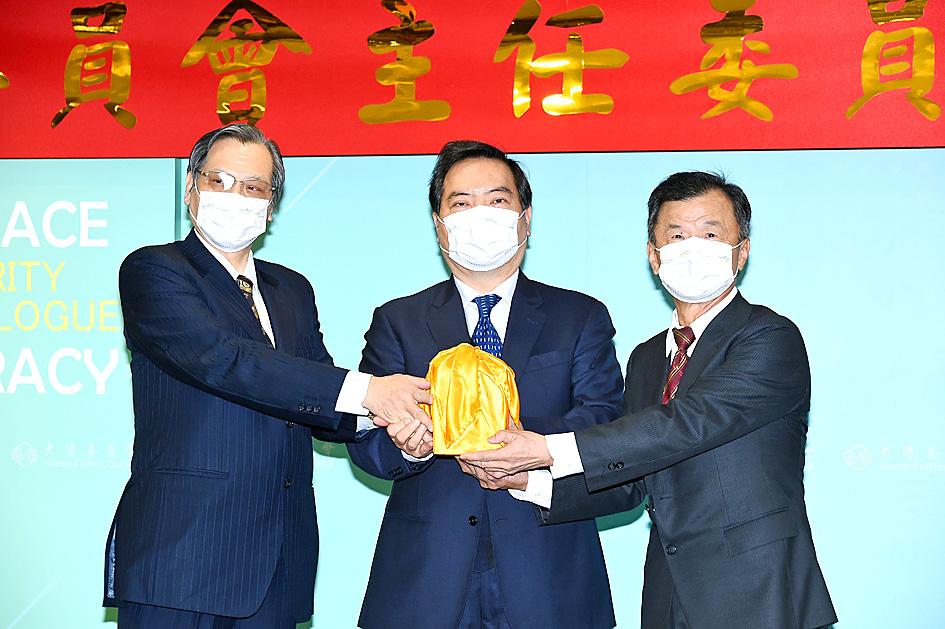New Mainland Affairs Council (MAC) Minister Chiu Tai-san (邱太三) yesterday at his swearing-in ceremony pledged to do his best to break the cross-Taiwan Strait impasse without sacrificing the nation’s sovereignty, but offered no specifics on how he planned to achieve it.
Former National Security Council adviser Chiu said in his address that Taiwanese and Chinese are anxiously hoping that they can resume normal exchanges once the COVID-19 pandemic is properly contained, pledging to do his best to meet the public’s expectations to end the cross-strait standoff and improve ties, while upholding Taiwan’s sovereignty and democratic system.
Chiu was sworn in to succeed Chen Ming-tong (陳明通), who was named National Security Bureau director-general.

Photo: Tu Chien-jung, Taipei Times
Chiu, a 64-year-old former lawmaker and prosecutor, served as President Tsai Ing-wen’s (蔡英文) minister of justice from 2016 to 2018, and held the No. 2 post at the MAC from 2004 to 2005 in a previous Democratic Progressive Party administration.
His appointment was part of a reshuffle of three Cabinet-level officials announced by the Presidential Office on Friday last week.
The appointment of Chiu could be seen as a friendly gesture to Beijing, as Chiu is known to be dovish in his approach to cross-strait issues, academic Chao Chun-shan (趙春山) has said.
Beijing has taken a hardline stance on cross-strait relations. It cut off dialogue with Taipei after Tsai took office in May 2016 and refused to accept the so-called “1992 consensus.”
The “1992 consensus” refers to a tacit understanding between the Chinese Nationalist Party (KMT) and the Chinese Communist Party that both sides acknowledge there is “one China,” with each side having its own interpretation of what “China” means.
The DPP contends that the consensus never existed and is “a mere illusion,” because China does not recognize the principle that each side is free to interpret “one China” as it sees fit.
Asked about the so-called “1992 consensus,” Chiu said that Beijing’s version focuses on the “one China” part of the formula, which sees Taiwan as part of the People’s Republic of China, “which is unacceptable to Taiwanese.”
Beijing’s continuous insistence on the “1992 consensus” and the “one China” principle as the basis for cross-strait exchanges is detrimental to Taiwan-China relations, he said.
Chiu called on Beijing to “be more practical” in pushing for cross-strait interaction to enhance mutual trust.
Separately yesterday, the Ministry of National Defense held a closed ceremony for the inauguration of new Minister of National Defense Chiu Kuo-cheng (邱國正), who was formerly National Security Bureau director-general.
Chiu Kuo-cheng succeeds Yen De-fa (嚴德發), who was handed an advisory role with the National Security Council.
Minister Without Portfolio Lo Ping-cheng (羅秉成), who presided over the ceremony, said that Chiu Kuo-cheng is an exceptionally capable official and the government has high hopes for him as the new leader of the ministry, the Military News Agency reported.
Additional reporting by Aaron Tu

DEFENSE: The National Security Bureau promised to expand communication and intelligence cooperation with global partners and enhance its strategic analytical skills China has not only increased military exercises and “gray zone” tactics against Taiwan this year, but also continues to recruit military personnel for espionage, the National Security Bureau (NSB) said yesterday in a report to the Legislative Yuan. The bureau submitted the report ahead of NSB Director-General Tsai Ming-yen’s (蔡明彥) appearance before the Foreign and National Defense Committee today. Last year, the Chinese People’s Liberation Army (PLA) conducted “Joint Sword-2024A and B” military exercises targeting Taiwan and carried out 40 combat readiness patrols, the bureau said. In addition, Chinese military aircraft entered Taiwan’s airspace 3,070 times last year, up about

The Overseas Community Affairs Council (OCAC) yesterday announced a fundraising campaign to support survivors of the magnitude 7.7 earthquake that struck Myanmar on March 28, with two prayer events scheduled in Taipei and Taichung later this week. “While initial rescue operations have concluded [in Myanmar], many survivors are now facing increasingly difficult living conditions,” OCAC Minister Hsu Chia-ching (徐佳青) told a news conference in Taipei. The fundraising campaign, which runs through May 31, is focused on supporting the reconstruction of damaged overseas compatriot schools, assisting students from Myanmar in Taiwan, and providing essential items, such as drinking water, food and medical supplies,

A magnitude 4.3 earthquake struck eastern Taiwan's Hualien County at 8:31am today, according to the Central Weather Administration (CWA). The epicenter of the temblor was located in Hualien County, about 70.3 kilometers south southwest of Hualien County Hall, at a depth of 23.2km, according to the administration. There were no immediate reports of damage resulting from the quake. The earthquake's intensity, which gauges the actual effect of a temblor, was highest in Taitung County, where it measured 3 on Taiwan's 7-tier intensity scale. The quake also measured an intensity of 2 in Hualien and Nantou counties, the CWA said.

STRICTER ENFORCEMENT: Taipei authorities warned against drunk cycling after a sharp rise in riding under the influence, urging greater public awareness of its illegality Taipei authorities have issued a public warning urging people not to ride bicycles after consuming alcohol, following a sharp rise in riding under the influence (DUI) cases involving bicycles. Five hundred and seven people were charged with DUI last year while riding YouBikes, personal bicycles, or other self-propelled two-wheelers — a fourfold increase from the previous year, data released by the Taipei Police Department’s Traffic Division showed. Of these, 33 cases were considered severe enough to be prosecuted under “offenses against public safety,” the data showed. Under the Road Traffic Management and Penalty Act (道路交通管理處罰條例), bicycles — including YouBikes and other